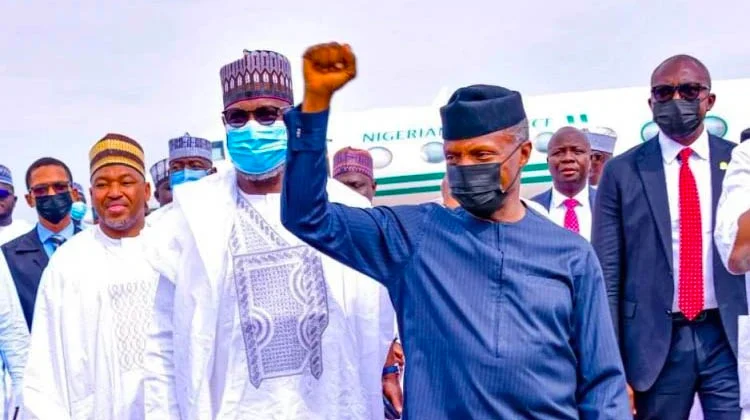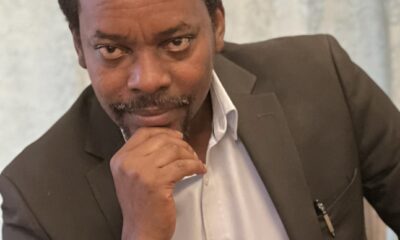Democracy & Governance
“10 Reasons Osinbajo Will Ignite a Religious Civil War”: A Rhetorical Analysis -By Isma’il Bello El-Ibrany
The Hausa word for cock is “zakara”. And zakara is figuratively used to describe a winner or a champion. And so Hausa-speaking Muslim North would construe this portion as the VP celebrating to have “won” from their own to his Christian faith. The author also used a rhetorical device called “aphorism”. It is the use of sayings to enrich or strengthen a point in argument. He used a quote by Otto von Bismarck: “Never believe anything in politics until it has been officially denied.”

Introduction
This essay rhetorically analyzes a March 21, 2022 article titled “10 Reasons Osinbajo Will Ignite a Religious Civil War”. Farooq Kperogi wrote it and is called in this rhetorical analysis as a rhetorician. The rhetorician warned Nigerians about the risk of mixing politics with religion which his tenth reason brilliantly captured this point: “…Osinbajo does n’t share the late sage’s [Awolowo] wisdom that politics and religion should n’t be merged.”
Why write a rhetorical analysis? First, the article consumed both traditional and social media alike like a fire. Second, it was translated into Hausa, a widely spoken language in Arewa. So it appealed more to Muslim North than to the rest of the country. Why? Because they were the intended audience.
Aristotle, in his 350 BC work titled “Rhetoric”, defined the concept of rhetoric as “the faculty of observing in any given case the available means of persuasion”. The key word is ‘persuasion’. How does a rhetorician persuade his or her audience? There are, according to Aristotle, three modes of persuasion. These are ethos, logos, and pathos.
Ethos is the credibility or character of the rhetorician. Logos is the use of reasoning, facts, pieces of evidence, or proofs to convince the readers. Pathos is the ability of a rhetorician to stir emotions in the audience whether positive or negative. The power of persuasion revolves around the rhetorical triangle―Ethical, Logical, and Emotional appeals. Although there is also “Kairos”, but it will be discussed toward the end of this analysis.
Ethical Appeal
The credibility of the rhetorician, Farooq Kperogi, revolves around at least two points. First, the rhetorician was not a mere pedestrian, but a Professor of Journalism. He is already an established authority in academia, a public commentator, and a social critic. Second, he has a history of consistency in criticizing public officials.
He reminded the audience of his consistency when he wrote: “Osinbajo is n’t the only religious bigot in high office in Nigeria. I spent the last seven years calling out the religious bigotry of fellow northern Muslims, including calling out the northern Nigerian Muslim clerical establishment for being in bed with the Buhari regime, at the expense of my ostracism not just in my region but even in my hometown where Imams recite maledictions against me…”. This is no doubt an ethical appeal, which would solidify his argument.
Logical Appeal
The rhetorician used publicly available facts to persuade his readership. He used enthymeme (or rhetorical syllogism) and example (or rhetorical induction) which he heavily drew from newspaper accounts to corroborate his claims.
Moreover, the whole article is structured using a rhetorical device called “enumeratio”. The reasons are listed from the first to the tenth. The effect of this rhetorical device is to spark the interest of the reader. The reader was led through the reasons until he reached a climax.
Again, the rhetorician employed figurative language to boost the imagery of his argument. He used fiery words to invoke the imagery of fire. For example, the word “ignite” as used in the title conjured the image of inferno. Another word is “volcano”. All these words evoked the image of fire, thus suggesting seriousness the rhetorician wanted to instill in his audience.
The writer also used a rhetorical device known as the “Sentential Adverb” in the first sentence of the article: “A Yemi Osinbajo presidency would, without a doubt, plunge… .” “Without a doubt” is clearly a sentential adverb meant to add emphasis to the sentence. Sentential Adverbs could be a word or a phrase. Other examples of it are: “in fact” and “of course”.
The writer also described a phrase “Muslim fundamentalist” as a “rhetorical cudgel”. This helped to bring out the animosity between Yoruba Christians and Yoruba Muslims. “Cudgel” is a weapon which the writer used to invoke the image of oppression, suppression of Yoruba Muslims in south-western Nigeria.
Another trope is the author’s use of synecdoche when he applied “lost souls” to describe how Osinbajo views Muslims generally. “Soul” represented part of humans. So “lost souls” is synonymous with “lost persons or people”. Perhaps spiritual loss. Also, the name of Olusegun Mimiko’s mother had an alliterative effect: “Mama Muinat Mosenkola Mimiko… .” This is not surprising for the rhetorician is a master of alliteration.
Another imagery is when the rhetorician described Osinbajo to have “crowed with perverse joy over her [Mama Muinat] late-life conversion to Christianity”. “Crowed” is associated with cocks. But the rhetorician used it tropically. The image of a cock could also symbolize a “champion”.
The Hausa word for cock is “zakara”. And zakara is figuratively used to describe a winner or a champion. And so Hausa-speaking Muslim North would construe this portion as the VP celebrating to have “won” from their own to his Christian faith. The author also used a rhetorical device called “aphorism”. It is the use of sayings to enrich or strengthen a point in argument. He used a quote by Otto von Bismarck: “Never believe anything in politics until it has been officially denied.”
He used a powerful hyperbole when he described Osinbajo’s religious bigotry as “in a world of its own”. Hyperbole is obviously a rhetorical device which exaggerates statements for the sake of emphasis. He also used “dagger” to describe how Osinbajo was using it to “fight” Tinubu in particular, and Muslims in general. “Dagger” figuratively represents “weapon”. So Christianity is to Osinbajo what gun is to a soldier.
The next most powerful rhetorical device used is when the rhetorician described the VP as a “matchbox” and “flame”. This is clearly a metaphor. Osinbajo is the Christian matchbox that would ignite religious fire when he collided with a Muslim matchstick.
The metaphorical description of the VP as a “flame” has two meanings: flame burns painfully and it often has red color and, thus, symbolizing danger. And so, according to the rhetorician, Osinbajo would destroy everything in his path and is, therefore, dangerous as a president. The author of the article did an excellent job in rhetorically but politically damaging the political portrait of the VP for good.
Emotional Appeal
He opened the article by instilling fear in the minds of the intended audience, thus stirring negative emotions. He did so by using the word “plunge”. Thus evoking an image of Nigeria as a kinda aircraft with passengers on board that would crash. Where? “…into the depths of smoldering religious volcano… .” These fiery, volcanic words had been used to capture and frame the mind of the reader to have strong emotional appeal. Fear, they say, is a strong motivator.
The writer used the emotional appeal as a background before presenting his logical appeal. In fact, the entire ten reasons have been laced with the pepper of fear. The whole emotional appeal of the piece is that of fear that is why the author made sure it grabbed his audience, too. And he did that excellently by using fiery imagery.
Why Kairos Matter?
Kairos, in rhetorical studies, is the effective choice of time to write about a topic. The rhetorician wrote his warning piece when Nigeria’s major political parties were about to begin primary elections. Although some opined that the writer should have waited until the VP became a candidate of his party. Well, whether before or after primary election, the article contributed, among other factors, to making a substantive VP to become a distant third in his party’s election.
Conclusion
The tenth point touched the main aspect of the article. The tenth reason is the most important, if the author applied order of importance, that is, from the least important to the most important as I think, stressed indirectly the constitutional character of Nigeria. Nigeria is, constitutionally speaking, a secular state. No any religion should be imposed on the masses as a state religion.
Although the article in question attracted several rebuttals, but it seemed it was an anvil and so the hammers were irremediably shattered. The writer of the article metaphorically described Osinbajo as a “matchbox” and a Muslim of his same religious bigotry as a “matchstick”. Well, in reality, in Nigeria it’s politics and religion that are “matchbox” and “matchstick” respectively. Or they are petrol and fire that must not be mixed. The mixture of religious bigotry and toxic partisan politics will one day ignite inferno that can not be doused and ultimately but literally burn Nigeria into ashes.
“10 Reasons Osinbajo Will Ignite a Religious Civil War” will undoubtedly go down in the annals of rhetorical records as one of―if not―the most powerful and persuasive piece (s) written in 2022. It is, in my opinion, the best and most rhetorically penned piece of this year, 2022.
Isma’il Bello El-Ibrany is a freelance writer and writes from Gombe

















